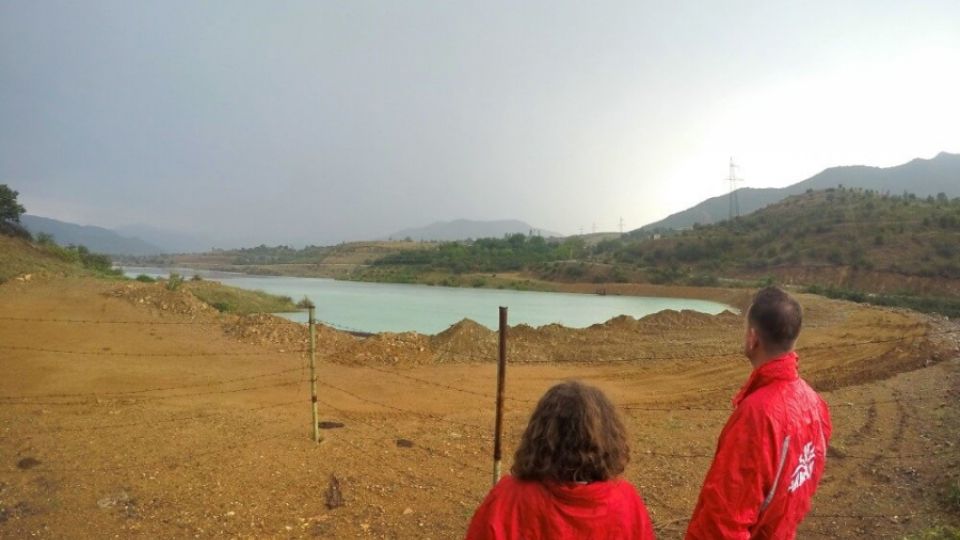The level of contamination of the environment in Northern Armenia is the subject of a new research study conducted by experts from the University of Chemistry and Technology in Prague. Accompanied by the Czech organization, Arnika, the team collected soil and sediment samples. In the university laboratories, the materials are now being analysed for toxic substances. The findings of the research are expected to be published in November 2018.
The sampling took place in the most polluted Armenian province, Lori. Here, mining and metallurgical activities are concentrated and include the Alaverdi copper smelter and non-ferrous iron-ore mines in Teghut and Akhtala.
“We’ve witnessed suspicious phenomena during our fieldwork,” explains Arnika’s project coordinator Nikol Krejčová. “Grey, blue, and yellow rivers, damaged tree leaves, or the spread of fine ash – the question is whether and how those are linked to the environmental pollution caused by, for example, the Alaverdi copper smelting plant; smoke from which flows through the valley striking the neighbouring villages,” she continues.
Support from university and local organizations
Academics from the University of Chemistry and Technology in Prague, Ing. Marek Šír, Ph.D and Martin Bystrianský, are analyzing the samples that were collected in order to provide Armenian inhabitants, as well as the government and local authorities, with reliable scientific data.
The study will provide hard data and should help optimize the necessary legislation, Nikol Krejčová states. “The situation would become much more acceptable and safer through the adjustment and strengthening of the environmental laws without the need to shut down the industrial enterprises,” she explains, hoping to achieve this goal through joint work with Armenian partner organizations.
One of them is the NGO Armenian Women for Health and a Healthy Environment (AWHHE). The director of AWHHE, Elena Manvelyan, welcomes the research: “The project is of great importance for the local population in order to have a better future. The people living in polluted areas will have the right to ask the appropriate state authorities for a solution to the problem and protection, as well as to go to an international court if the results of the analyses show levels of polluting substances exceeding health risk standards. We highly appreciate the research initiative of Arnika, which has experience in this field both in Armenia and other countries of the world,” stated Manvelyan as expressed her expectation of the results.
Villages learning about human rights
The president of the informational NGO EcoLur referred to the workshops which the organizations held for local activists: “The seminars for the people from Alaverdi, Akhtala, Shnogh, and Teghut showed that people are eagerly awaiting the results of the analysis of the levels of chemicals in their immediate environment, which is being carried out right now by the Czech experts,” Inga Zarafyan noted.
“Local residents hope that the research carried out by a team experienced in chemical safety issues will help them justify their requirements to Teghout CJSC and also to the Government of the Republic of Armenia on the issue of responsibility for pollution of their villages. People also believe the study will raise the dialogue within responsible bodies to a new level,” Zarafyan also added.
PHOTOGALLERY: In Armenia among ancient monasteries and dangerous mining
Environmental democracy is far from ideal in Armenia, and the improvement promised by the Armenian Velvet Revolution will take time. Silva Ayvazyan from the Aarhus Centre in Yerevan commented that “the whole group of civil society environmental initiatives welcomes the project implemented in the Lori region with the support of the Czech Ministry of Foreign Affairs, in the belief that the results of the chemical analyses of samples taken in potentially polluted areas can change the situation for the better and will help preserve this beautiful and rich natural environment for the good of the people.”
The research is a part of the "Involvement of Civil Society in Decision Making Process on Mining in Armenia" project supported by the Transition Promotion Programme of the Ministry of Foreign Affairs of the Czech Republic.








